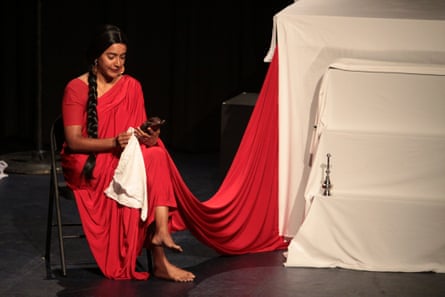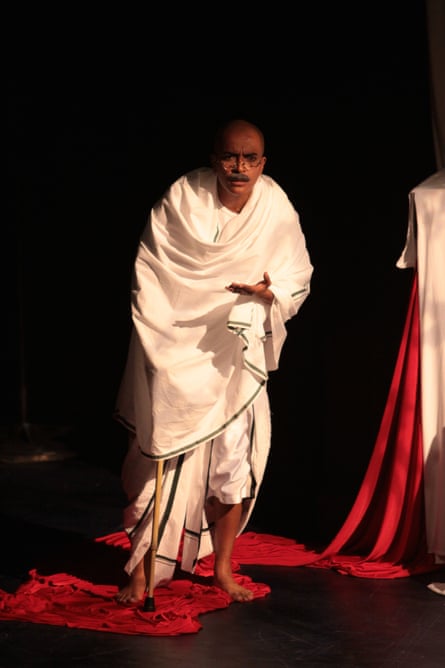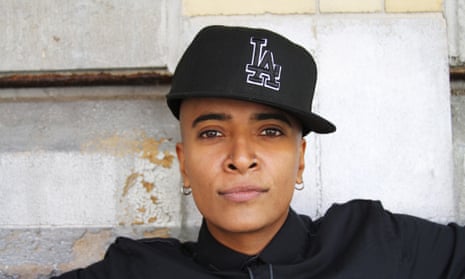The set is stark black. A barefoot woman draped in a red sari with a long, black braid perches at the edge of a chair. “You know, D’Lo told me she was a gay,” she begins with an undulating accent. “Since then, she has further explained that not only is she a gay, she is feeling like a little boy trapped in a woman’s body.”
She pauses and searches the audience.
“I tell you, we should have never left Sri Lanka. We don’t have the gays in Sri Lanka!”
The audience erupts in laughter.
The character, Amma Shock (amma means “mother” in Tamil), is the creation of Los Angeles-based comedian, rapper, poet and performing artist D’Lo D’Loco Kid. And in this singular sketch, D’Lo deftly examines the psychic and social barriers he experiences as a queer transgender Tamil Sri Lankan-American.
But D’Lo’s impressive body of work extends beyond themes of gender and sexual identity – it challenges socio-political, economic, racial and cultural structures.
Born in Queens, New York, D’Lo moved with his Sri Lankan immigrant parents and older sister to Lancaster, California, a small town 70 miles outside Los Angeles, when he was just two years old. At the time, D’Lo says, Lancaster was “hick, redneck, and racist”. Yet despite its lack of ethnic diversity, Lancaster sired a tight-knit Sri Lankan, Tamil-speaking diaspora and most of D’Lo’s childhood friends were Sri Lankan. “We weren’t really allowed to have white friends,” he says.

D’Lo discovered hip-hop at a young age. He idolized the work of Nas, Rakim, Queen Latifa, MC Trouble and MC Smooth. “I was 11 years old when I first saw Yo! MTV Raps. I was mesmerized by people trying to empower and uplift their communities through song.” His discovery of rap coincided with his realisation that he was not like other girls his own age, though for the time being he kept this realisation to himself.
D’Lo began writing rhymes while still in high school, and debuted as a spoken word artist in college at UCLA, where he was studying ethnomusicology. “College is where I started blossoming as an artist,” he says.
A few months before graduation, he had no choice but to come out to his family. “My father called me up to try to arrange my marriage [to a man]. I came out to get out of it.” D’Lo’s process of coming out evolved over time – when the language and rhetoric of his community, which honored more complex notions of identity, caught on in popular culture. “I like to say I came out three times – the first time as gay, the second time as having a girlfriend and the third time as trans.” He also identifies as “boi”, a term that embodies a sort of soft masculinity.
D’Lo returned to New York after graduation, hoping to produce hip-hop and world music. But rave reviews of his spoken word performances in college followed him to the city, and soon he was being offered paid gigs to perform. “I’m lucky,” he admits. “I haven’t had to work as hard to get shows.” He credits his mentors in the business – other queer artists of colour like Susana Cook, Sharon Bridgforth and Adelina Anthony – with his swift success. “[My mentors] challenge me about what it means to be vulnerable as an artist and what it means to be a ritual theatre performer.”
D’Lo has produced three solo shows, performing them everywhere from New York to San Francisco, as well as in India and Sri Lanka. In Ramble-Ations, he portrays five different characters, including Amma Shock, to articulate the challenges immigrants face when expressing their culture and traditions on American soil. Minor D’Tales considers queer love and the artist’s personal and complicated relationship with Sri Lanka as a trans masculine person. D’FunQT delves into his experience as being transgender in a strict immigrant family. Recently, D’Lo wrapped a multi-city tour in Texas of a more theatrical version of D’FunQT.

Despite his flare for comedy, D’Lo doesn’t shy away from dissecting gender norms, sexuality and the stereotypes of marginalised populations. His shows “flesh out human contradictions rather than push an agenda” and strive to answer an essential question: “How the hell do we want to grow up as queer people, to survive, with respect to community politics?” The answer, he adds, “can make or break a queer person”.
For this reason, D’Lo feels enormous pressure for how he conveys his message. “What is my responsibility as someone on a transition journey? What is my responsibility as a thinking queer person with respect to sexism and misogyny in the world? How do I create meaning in everything I do?” It’s a fluid process, and one that he is constantly refining with a blend of urgency and quiet reflection.
D’Lo’s artistic journey has recently taken him to another level – television and film. He has had small roles in features and shorts, as well as in several television series including HBO’s Looking, Amazon’s Transparent and Netflix’s Sense8 – remarkable feats considering he has neither a manager nor an agent. “My opportunities have come through word of mouth, from people who really believe in my talent,” he says. “I feel really blessed.”

Comments (…)
Sign in or create your Guardian account to join the discussion